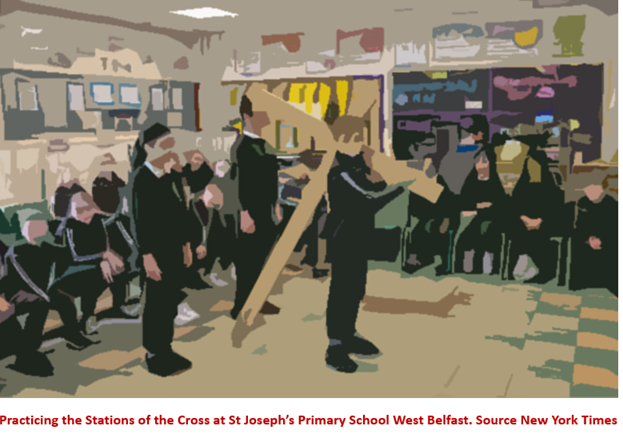Supreme Court rules against exclusively Christian indoctrination in NI Schools

In 2019, a pupil at a controlled primary school in Belfast took part in non-denominational Christian religious education and collective worship as part of her curriculum. Her parents wrote a letter to the school to say that their daughter’s education did not appear to conform with their own religious and philosophical convictions. In a reply, the school confirmed its provision of religious education and collective worship was “Bible-based” and that it followed the core syllabus for education.
The pupil and her father challenged the legality of this and sought judicial review against the Department of Education, arguing that the religious education and collective worship in the school contravened their human rights, which, according to the Human Rights Act (1998) require the state to provide education
to "respect the right of parents to ensure such education is in conformity with their own religious and philosophical convictions".In 2022, the High Court in Belfast found in favour of the family, stating that both the Christian RE curriculum and Christian collective worship in schools in Northern Ireland is unlawful. However, this was overturned by the Court of Appeal, so the family took their case to the Supreme Court, which in a unanimous judgement allowed the appeal brought by father and daughter and dismissed a cross-appeal brought by the department.
by Odhrán Cassidy, 21st November 2025
The Supreme Court judgement of 19th November lays bare the failures of a segregated education system designed to perpetuate division. The ruling, which found that religion is not taught in an “objective, critical, and pluralist” manner, exposes the State’s fundamental neglect of its young people and its role in upholding an oppressive status quo.
The initial 2022 judgement correctly identified that the so-called ‘opt-out’ for daily worship is a cynical fiction. The court stated that merely allowing parents to withdraw their children does not absolve the State of its breach of the Human Rights Act 1998[1] and the European Convention on Human Rights 1950[2]. These breaches specifically violate the right to a good education and the freedom of thought and religion. The ‘opt-out’ was deemed insufficient because it “placed an undue burden on parents,” would “deter parents from seeking exclusion,” and crucially, would “run the risk of stigmatising their children” [3]. This reveals the inherent coercion and social pressure built into the system, forcing conformity and marking out those who dissent.
This institutional failure is no accident. A recent poll shows that 65% of parents are in favour of an integrated education model [4], a demand the state consistently ignores, with a mere 7% of schools across all ages being integrated [5]. This gap between public will and state inaction is a feature of the liberal state that manages, rather than resolves, the sectarian divisions inherited from its capitalist and imperialist foundations.
While we welcome the court’s ruling, we must be clear: this problem cannot be resolved through the very bourgeois institutions that uphold it. We call upon students, parents, and workers to organise beyond the courtrooms and demand what is rightfully ours. Unless we build collective power to demand a fully integrated, secular education system - one that seeks to dismantle the national and religious divisions sown in our classrooms - we will continue to reinforce the figurative walls between our communities. The ‘peace’ walls will never come down otherwise, because the state has no interest in tearing them down; only reinforcing them.
1. Human Rights Act 1998 (1998). Human Rights Act 1998. [online] Legislation.gov.uk. Available at: https://www.legislation.gov.uk/ukpga/1998/42/schedule/1/2004-06-22.
2. Council of Europe (1950). European Convention on Human Rights. [online] Available at: https://www.echr.coe.int/documents/d/echr/Convention_ENG.
3. Supreme Court (2025). Judgement in the Matter of an Application by JR87 and Another for Judicial Review (Appellant). [online] Available at: https://www.supremecourt.uk/cases/uksc-2024-0095.
4. Integrated Education Fund (2025). A NI Poll-Survey for the IEF - Jan 25.
5. Clark, D. (2025). Northern Ireland Number of Schools 2025. [online] Statista. Available at: https://www.statista.com/statistics/385474/schools-in-northern-ireland/#statisticContainer
and
Education Authority (2025). Integrated Education. [online] Education Authority Northern Ireland. Available at: https://www.eani.org.uk/parents/types-of-school/integrated-education.
